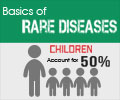Treatment and Prognosis
Currently there is no cure for progeria although scientists hope to reverse the disease in the future.
There were reports in the 2006 issue of Chemistry and Industry that cancer-treating farnesyl transferase inhibitors (FTIs) can be used to reduce the severity of progeria symptoms. Children with Progeria have deformed nuclei; treatment with FTI has resulted in a surge of normal- shaped nuclei and this has, in turn, resulted in reduced severity of the symptoms.
It has additionally been discovered recently that drugs such as pravastatin and zoledronate, when added to FTI, is far more potent than FTI administered alone. The drugs hope to paralyze the functioning of the age-accelerating ‘progerin’. Clinical trials are underway to establish this theory! As mentioned earlier, Progeria-affected children very often die from health complications even while in their teens. More than 80% of affected children die from complications related to the heart.
Average life span of these progeric children is thirteen years, although few have survived till their early twenties. They usually do not live long enough to produce progenies of their own. The older they live the more aware they become, of the way they look and their overall health status, and the more difficult it becomes, for them, to emotionally cope with the situation.
Children with progeria, and their families, may seek the comfort of support groups such as, The Progeria Project Foundation and The Sunshine Foundation to learn to cope with their problem physically, mentally, emotionally, socially and in all other ways possible.










